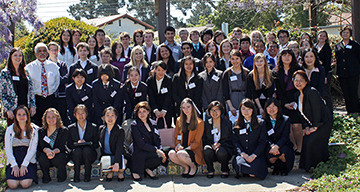Masako Toki
May 30, 2013
The Critical Issues Forum (CIF)

The 2013 spring conference, the culmination of the semester-long project, was held on April 19th and 20th at Santa Catalina High School in Monterey. The nonproliferation and disarmament education project develops students’ critical thinking skills with an appreciation of national and cultural perspectives.
Students from Japanese high schools in Hiroshima and Nagasaki, the two cities devastated by atomic weapons in 1945, participated for the first time in the 16-year old program. A major Japanese media outlet, NHK’s (Japan Broadcasting Corporation, Japan’s national public broadcasting organization) Nagasaki office interviewed participants and covered the conference proceedings to make a documentary about the project.
This year’s program is funded in part by the United States-Japan Foundation. The program also receives support from the Chapman Foundation in Monterey.
Toward a World without Nuclear Weapons
President Obama’s Prague speech in April 2009 pledged US commitment to the security of a world without nuclear weapons. State parties to the Treaty on the Non-Proliferation of Nuclear Weapons (NPT) then adopted a disarmament section to the treaty’s comprehensive Action Plan. Three years later progress remains limited.
Students’ Presentations
High schools from the United States, Japan and Russia delivered final presentations. The students became aware of the responsibility they bear as future leaders in nonproliferation and disarmament.
Japan
Peace Education
Jogakuin Senior High School, Hiroshima
Students presented the experiences of the atomic bombing of their senior high school and the importance of disarmament education.
Lessons from Tragedies: Nagasaki Students’ Message for World Peace
Kwassui High School, Nagasaki
The students explained the long-term and unknown dangers of radiation exposure through the experience of one student’s grandmother. They introduced their school’s petitions for peace and nuclear abolition, which has been gathering signatures for over the thirteen years and is being recognized by the United Nations. The students also wrote an English translation of Furisode no Shojo (Girls in Kimon), about the deaths of two girls by an atomic bomb.
One Step to a Nuclear Free World
Yasuda Girls High School, Hiroshima
Students presented a no compromise policy on nuclear abolition and how global efforts could go beyond controlling and reducing nuclear weapons.
Russia
Where Do We Go from Here?
Gymnasium #41 in Novouralsk, Russia
The Russian students are from one of the closed nuclear cities, established during the Cold War, where peoples’ lives center on the nuclear industry, nuclear weapons and their essential ingredients.
United States
Prospective Steps to Reach a World Free of Nuclear Weapons
Choate Rosemary Hall
The presentation included a vision of a nuclear weapon-free world and how to maintain it.
Trends in Nuclear Sharing (PowerPoint file)
Franklin High School
Students analyzed the cold war thinking of political alliances. As an example, they presented NATO’s nuclear sharing policy of US weapons in European countries.
Shaping the Future
Janesville Academy
Students presented details of the Treaty on the Non-Proliferation of Nuclear Weapons (NPT) and timelines of the best and worst possible outcomes of a world with nuclear weapons.
Do We Need a Nuclear Free World?
La Puente High School
Students conducted a role-play to show the challenges and prospects of the current NPT Regime. Three students were assigned to play the role of the United States, North Korea, and South Africa. Each “representative” described “their” country’s nuclear and security policy and its historic background.
Nuclear Issues and the Pacific Islands: The Marshall Islands
Mid-Pacific Institute (Honolulu)
Students presented the risks and benefits of having a nuclear weapons program through videos of descendants of the Marshall Islands who needed to relocate due to US nuclear weapons testing.
The Path to Nonproliferation
Presque High School
Students used the Socratic method to present the actions of the rogue state of North Korea and the responsibility of the international community to use diplomacy or economic sanctions to resolve conflict.
Toward a World without Nuclear Weapons: Progress, Prospects and Challenges
Santa Catalina School
Students presented steps to a peaceful society by exposing the lack of enforcement mechanisms in the NPT Regime. They reviewed a variety of proposals for effective implementation of nuclear disarmament, such as establishing an international fuel bank and strengthening the role of the United Nations. After their presentation, the students held a discussion about solutions to North Korea’s nuclear crisis.
Lectures
US Nuclear Policy
Jon Wolfsthal, Keynote Speaker
CNS Deputy Director
Former Special Advisor to Vice President Joseph Biden for Nuclear Security and Nonproliferation
The keynote speaker shared his experience supporting the Obama administration’s negotiation and ratification of the New Strategic Arms Reduction Treaty with the Russian Federation. He also discussed his involvement in the development of nuclear policy through the 2010 Nuclear Posture Review.
Japan’s Disarmament and Nonproliferation Policy
Tetsuya Iwata
Consul at the Consulate General of Japan in San Francisco
Nuclear Disarmament & International Security Issues
Sayaka Shingu
MIIS Alumna, Masters in Nonproliferation and Terrorism Studies
Intern, The United Nations Office for Disarmament Affairs, NY
Sayaka Shingu, originally from Hiroshima, is currently interning at the United Nations Office for Disarmament Affairs in New York. She worked for the Ministry of Foreign Affairs of Japan, where she was granted a training period in the US to study nonproliferation issues.
Jonathan Ray
MIIS Graduate Student, Masters in Nonproliferation and Terrorism Studies
Jonathan Ray studies China’s nuclear issues and shared his interest in international security issues.
